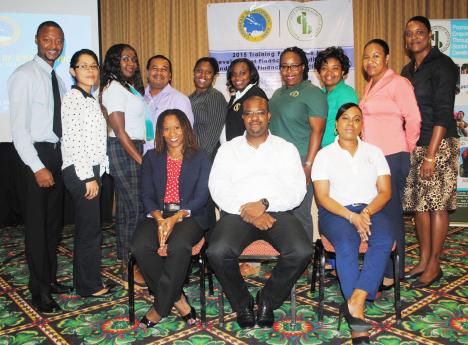


Credits: First training module participants, which was facilitated by Michel Williams, pose for a group picture (Caribbean News Now)
Published on November 26, 2015, BASSETERRE, St Kitts.- Participants in the second module of Caribbean Development Bank’s 2015 training programme for development finance institutions currently taking place in Basseterre, St Kitts, are being exposed to techniques to improve their capacity to appraise small and medium enterprise (SME) agribusiness projects seeking credit in the region.
The four-week training programme, which is organised by the CDB in collaboration with the Development Bank of St Kitts and Nevis, opened on Monday, November 16, and consists of four weekly training modules.
The second training module, credit appraisal with a specific focus on agricultural projects to be targeted at credit staff, which is being facilitated by David Logan, started on Monday November 23.
“The overall objective of the training programme is to build institutional capacity across key operational areas in the development finance institutions and indigenous finance institutions of the CDB’s borrowing member countries, including their ability to evaluate and finance SME projects including those in the agriculture sector,” said coordinator of the training programme Lisa Harding.
“As such, this four-week training programme will focus on improved capacity for SME lending, credit appraisal with specific focus on agricultural projects, enterprise risk management and loan recovery management,” she explained.
Harding, who is the operations officer, Private Sector Development Unit at the Caribbean Development Bank in Barbados, made the remarks on Monday November 23 at the opening session of the second module, which has ten participants from six CDB’s borrowing member countries (BMCs).
The participants are drawn from Bahamas (1), Belize (2), Jamaica (1), Dominica (1), Haiti (1), and host country St Kitts and Nevis (4). Harding was accompanied by the local coordinator of the training programme Danienne Brin, who is the manager, human resources, marketing and product development at the Development Bank of St Kitts and Nevis.
According to Harding, the Caribbean Development Bank has been highly supportive of the operations of development finance institutions since their establishment in the region several years ago, through the provision of technical assistance and lines of credit for the productive sectors, student loans for persons from poor and vulnerable households and mortgage financing for low to lower-middle-income earners.
She pointed out that development finance institutions and indigenous finance institutions in the region are facing increasing challenges brought on by globalization, the liberalization of the financial sector, climate change and technological advancement. These challenges are compounded by declining levels of concessionary assistance, increased competition from commercial banks and non-bank finance institutions, and a sharp increase in non-performing loans.
With respect to the agriculture sector in particular, Harding explained: “We at the CDB recognize that agriculture and related activities (forestry, fisheries and agro-processing) are significant contributors to economic growth, social development and poverty reduction in many of our borrowing member countries.
“The sector’s contribution to GDP, whilst on a general downward trajectory, remains higher than 20% in Guyana and Haiti and over 10% in Belize, Dominica and Suriname. The decline in the sector’s performance has impacted incomes and living standards, particularly in rural areas, leading to an increase in rural poverty and rural to urban migration in several countries.”
She further observed that the region’s food bill continues to increase, reflecting a growing inability of CDB’s borrowing member countries to meet their dietary needs from domestic production, adding that the sector remains a significant contributor to employment, income and food and nutrition security.
“It is therefore critical that building capacity of regional development finance institutions and indigenous finance institutions to appraise agriculture projects and to provide appropriate financing remain a priority for the Caribbean Development Bank,” Harding said.
She explained that the module ‘Credit Appraisal with emphasis on agriculture projects’ would cover all relevant aspects required for the appraisal of business plans for SME agri-business projects and would include specific areas such as clearly identifying the required project and the potential demand for the project outputs, implementation scheduling to match possible disbursement requirements, analysis of the borrower, project costing and revenue projections, and the preparation of the cash flow projections to help determine project viability and sustainability.
“Knowing that agricultural projects can be very risky, attention will be paid to determining levels of risk and how to plan for them,” Harding concluded. “We trust that the training will be of benefit to you and your institutions and that you will be able to apply knowledge gained this week when you return to your institutions.”
This week’s training is being facilitated by David Logan, who has conducted training in all aspects of project planning and management throughout the Caribbean and South Pacific. He was involved in the Caribbean Development Bank’s project training programme for over fifteen years, and was a part-time lecturer in Project Management at the University of the West Indies, Mona Campus for 16 years.